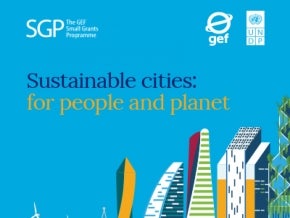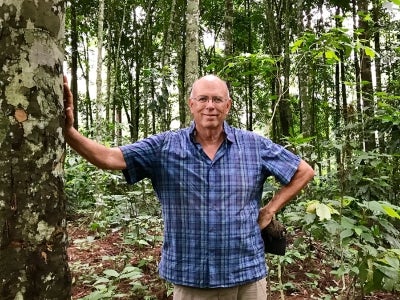
Yoko Watanabe is Global Manager of the GEF Small Grants Programme (SGP), which supports community-based efforts to address global environmental issues in developing countries. In an interview, she shared lessons from this work and reflected on her career path, which started with an internship at SGP when it was first established 30 years ago.
What do you enjoy most about your work?
My work is much more than a job, it is my mission and passion. I feel extremely fortunate to lead SGP’s dynamic and talented global team, currently covering 128 countries. We work with many partners to support initiatives led by civil society and local communities to address global environmental issues while improving livelihoods. These projects have both global and local environmental impacts, and positively change the lives of vulnerable populations, including women, Indigenous Peoples, youth, and persons with disabilities.
How did you get into this field?
In the early 1990s, I actually worked as an intern at SGP in Nepal when it had just been established. I worked with a local consultant to evaluate SGP’s portfolio of about 20 projects. I was really impressed by the impact of community-led initiatives in the remote areas of Nepal that built on traditional knowledge and local practices – from species conservation in the lowland of Terai to community-based forest management in the high mountains. I was truly inspired by the dedication of the local communities and saw how small grants could improve their well-being and conserve habitats and species at the same time. I was convinced back then that this was going to be my life’s work and focus – and I was right!
After completing my master’s degree in international development and environmental and natural resources management, I joined the United Nations Development Programme and led its biodiversity and climate change programs in the Nepal and Mongolia country offices. Later, I worked at the World Wildlife Fund and then joined the Global Environment Facility, where I held different positions including Program Manager on Biodiversity, Regional Coordinator for Asia, and Coordinator for Gender, Indigenous Peoples, and Social Issues. I eventually came back to my roots, at SGP where I started, to promote innovative, impactful, and inclusive community-led solutions to address global environmental issues.
What makes the Small Grants Programme special, for you?
SGP plays a unique role, as a source of financial and technical support to local action led by civil society and local communities that can have global impact. The communities we support are on the front lines of environmental challenges and often have excellent ideas and solutions that are nested in their local context and can be scaled up, replicated, and adapted in other places. We do this through South-South cooperation, knowledge sharing, policy dialogues, and others. Our program is constantly evolving and innovating, with strong experience on what works at the community level and what can lead to policy and program-level changes.

Can you describe a project that you are currently focused on?
I am always working to ensure SGP’s initiatives have the greatest possible impact, engaging closely with partners who share our goals. With my team, I am working on exciting new ventures with donor governments and the private sector to leverage the strong foundation of GEF finance for even wider reach.
For example, we are partnering with the Japan Ministry of Environment, Convention on Biological Diversity and others to improve the resilience of socio-ecological production landscapes and seascapes in 20 countries through the Community Development and Knowledge Management for the Satoyama Initiative Program (COMDEKS), which has been extended to contribute to the implementation of the new Post-2020 Global Biodiversity Framework.
Similarly, we are entering a new phase of partnership with the Australian Department of Foreign Affairs and Trade on the Community-based Adaptation Programme, focused on building the resilience of Small Island Developing States and Least Developed Countries in Asia and the Pacific.
We are also scaling up support to Indigenous Peoples and local communities through the Global Support Initiative for Indigenous and Community-Conserved Territories and Areas (ICCA-GSI), with funding from Germany’s Federal Ministry for the Environment, Nature Conservation, and Nuclear Safety.
Private sector collaboration also offers great opportunity and potential, and our partnership with Microsoft’s Project 15 through the Open Platform for Conservation and Ecological Sustainability Solutions is creating opportunities for community-based initiatives to accelerate innovation related to species conservation, sustainable fisheries, and agriculture through the application of digital solutions. We are also exploring partnerships with other companies that have shown interest in supporting local environmental initiatives through support for micro, small, and medium enterprises in developing countries.
What life lessons has your work taught you?
Working in conservation and sustainable development is truly rewarding, but it requires patience and strong determination. We need to constantly test new approaches and tools so that we can evolve and create greater impacts. Change does not happen in a vacuum, and requires long-term engagement, awareness-raising, and relationship building. More than anything, I have learned to remain open to new ideas and invest in iterative processes to improve solutions that can then be replicated and mainstreamed. I have also learned that one needs to be an optimist and have a long-term vision to bring about change at the needed scale.
Environmental issues are very often concerning. What gives you hope?
Witnessing the impressive results achieved on the ground every day by civil society and community-based organizations gives me great hope. I love to see and hear how the grants we provide make action possible, and how this action makes positive changes to the environment and peoples’ lives. Every day, I receive many messages from my team and partners about these successful stories – they bring me joy and hope that we can indeed make a difference even though the environmental challenges we face today are daunting. The leadership of local communities, including Indigenous Peoples, women, and young people, is essential to solving global environmental challenges in a sustainable way.
What are you looking forward to in the year ahead?
I am looking forward to celebrating SGP’s anniversary! One of the most exciting things about hitting a milestone like this is having the opportunity to reflect on how much has changed in the past three decades, since I was an intern. SGP has grown from a pilot program that covered only 33 countries into a unique global delivery mechanism now covering 128 countries that continues to scale-up local actions led by communities. SGP is not only an incubator and accelerator of community innovation, but has also grown to be a social inclusion platform that brings together civil society, government, private sector, and other actors to promote systemic change from the ground up. Over these years, the global community has increasingly recognized the essential role of civil society and local communities in protecting the environment and achieving sustainable development. I am really looking forward to further expanding the scope and scale of SGP in the coming years with the GEF and other partners.
What changes do you hope to see in the world by the time you retire?
During the past decade, we have seen great progress in bringing people to the center of conservation efforts. I hope to see the world taking further inclusive, rights-based approaches to conservation and sustainable development, by further strengthening engagement with Indigenous Peoples, women and girls, and youth. I believe that promoting systemic change from the local level is critical in creating the ripple effect needed to reverse the current global environmental trajectory.


